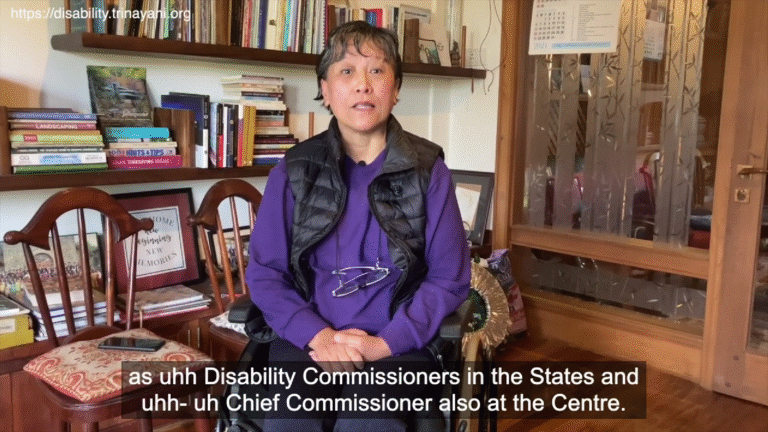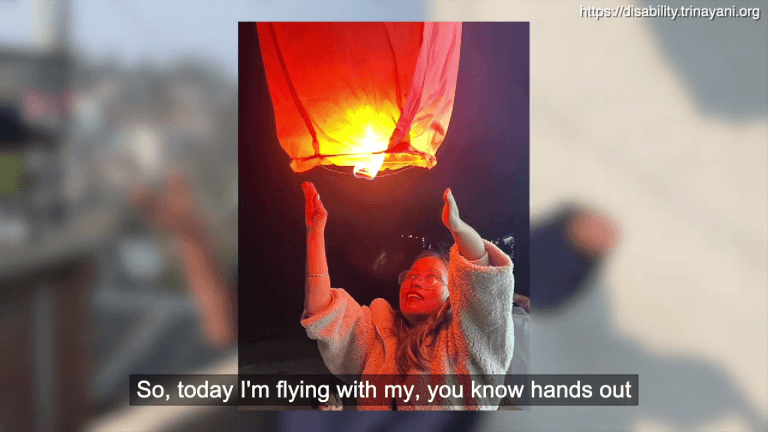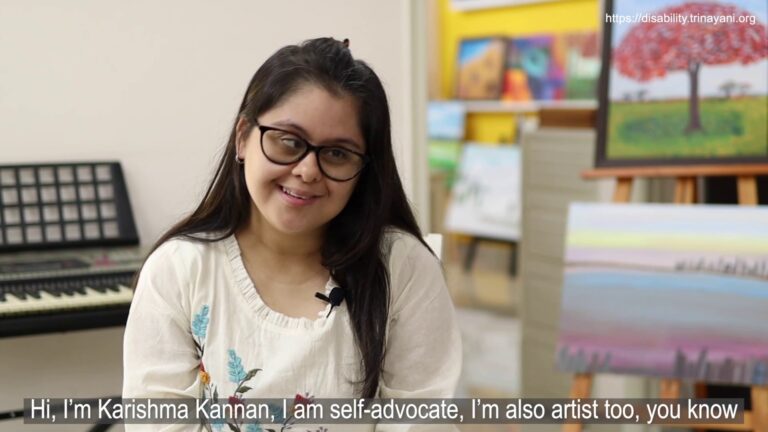The Bold Changemaker
This film features Abha Khetarpal – educator, advocate, and an unapologetic voice on disability and sexuality in India. In a society where these topics are often swept under the rug, she has brought them into the light with clarity, courage and care.
Through her lived experience and groundbreaking work, Abha challenges every stereotype and assumption about disability and sexuality. This film is about agency and promoting the idea that everyone deserves to feel seen, heard and desired.
This film is about the conversations most people avoid – disability and sexuality, featuring Abha Khetarpal, who decided silence wasn’t an option. From developing comprehensive sexuality education courses to building self-advocacy tools and challenging everyday stigma, her journey is one of persistence, providing support and breaking myths.
Abha boldly champions conversations about pleasure, consent, agency and love.
*
Yeah disability and sexuality are uh like a very hush-hush issue, especially in our society
Like, a person with disability and even talking about sexuality, sex or uhh things like that is not at all like, it is not a welcoming thing
So the dis…discourse is less that’s why nobody knows about the issues and nobody even cares about it
Even the dating thing, body image issues, even contraception, which is very important and sexual like, in uhh infections, STDs and all
So uhh in our country talking about this needs a lot of courage I think, and being a married woman with disability I think I have broken the ceiling at many places
And since I talk a lot about it, I have written a lot about it and still I am doing, I have uh prepared a Sexuality Education, Comprehensive Sexuality Education Course on it, an online course on it
So I think this is a very important subject because most of the focus is on the education, employment and other aspects of the life, but this aspect, completely is missing
People are scared to talk, they are ashamed to talk, they have, they feel awkward to talk on this subject
So I think I have made many people, even women, men to talk about, at least they are now asking about, they are asking certain questions, they, which they never used to ask
I I have received many, like, messages or calls from girls with disabilities, asking can we get married, can we get uh can we have a baby?
So I think this is quite revolutionary
And uhh things have changed
They are gradually changing thanks to social media that we are now exposed to the world
We know what else is going on in the different countries, different societies
So things are changing but at a very gradual pace, very slow
We need a lot of, more awareness campaigns, awareness programs on this issue
*
Could you tell us more about the comprehensive sexuality education course you designed?
Comprehensive sexuality education course, it was a complete course, and even for the, it is, it was in the form of TOTs even, Training the Trainers for special educators, which I did in 2016 and it was for an organisation, Feminist Approach to Technology
And even after that, after that I developed an online course for it
I uhh assisted uh NAB uh they had a project with the like, Kalinga uh Institute in Odisha, Bhubaneswar
So they had life skills program life skill education, even for that I helped in, for the sexuality education of teenagers, because we need to train them since their teens
Adolescence is a period where lot of changes happen
Hormonal changes in the body, uhh the individuals become conscious of their body, especially body image
And with the media, media showing all those things they get curious
They, they should know what is wet dreams and uh what is, what is ejaculation
They don’t even know, they don’t even know
So uh we developed certain lessons for the students there and even for Enfold Trust, it is in Bangalore, Enfold Trust, so they prepared such kind of document, teach, for teaching the special educators
Yeah, B.Ed students and special educators
So I have done a lot of work in this area and uhh I think the results are remarkable
It, it has impacted many people
And whenever people are talking about it, they are talking about it in a very open way now
Uhh I have even uh included the health care professionals
Two years back or three years back I developed a manual on SRHR, Sexual And Reproductive Healths And Rights, uh with the support of Women’s Fund, Asia
It was a complete manual for women with disabilities and mostly beneficial for the health care professionals
Because even health care professionals are unaware of certain things
How to do gynecological examination in women with different kinds of disabilities, those who have spasticity, though they have to be handled in a different way
Those who have developmental disabilities or for management of their menstruation, so even health care professionals, they found that very useful
*
How would you describe your marriage?
I was married in 2015 and uhhhh it was a love marriage
Uh we met over social media and uhh yeah we were friends at first, and then uhh we thought that we can be together rest, for rest of our life
And he is a very understanding person, he understands every bit of my problems
He even helps me in my daily chores like taking me to washroom or any, any other thing, in my personal things and he understands it very well
And we are very much, it is a, like a kind of an inclusive alliance, he is a non-disabled person, and but we still have a great married life
We uh, we have a great intimate relationship and no issues in that
And we both are satisfied with that
And he understands that I cannot use contraceptives because of my like, blood circulation problems and he never refused to use condoms
He never refused that
Otherwise I find that men in India, they refuse to use condoms
They think that it is not like, it doesn’t give them proper satisfaction
So the complete onus of contraception lies on women
But we understand each other and so uh there is no, like I think we are greatly compatible emotionally, intellectually, even physically and he is a great encourager
He encourages me a lot in my work, he supports a lot in my work and we fight a lot also, like any other couple
*
Have you ever thought about having children?
We never thought about it and I think it was not the correct time, the, the point of time when I got married, and because of my physical issues, I, I have scoliosis, I have rod in my spine and with my Post-polio Syndrome, so with my deteriorating muscle strength and all, we never thought about it
*
Do tell us about the toolkits you have developed.
So recently I developed another toolkit for self-advocacy of women with disabilities, because women with disabilities, I have found, that they cannot advocate for themselves
What color do they like to wear, what food they like, do they like to eat, where do they want to go, if they have any physical issues, any, any uhh like a disease or any, if they are facing ill health, they can’t even gather their guts to complain to their family members, at many places
They are always suppressed and their needs are always overlooked
Nobody takes care of them
So that toolkit is on their self-advocacy
How can they advocate for themselves
If some like, if violence is there, if, because sexual violence is very common, so if, how can they complain, they, how can they write letters, send mails to the concerned person and how can they file FIRs or anything
In their schools, in, in their colleges, workplaces, what kind of reasonable accommodation they can ask for
So that toolkit caters to that completely
And another manual that I developed was for women with leprosy
Leprosy is another marginalised area
Nobody cares for them, they are just sent outside the city to live and there is whole lot of stigma attached to leprosy, though it is perfectly curable, 100% curable
So that uhh manual caters to their self-care, because after getting cured, after getting treatment the infection can again crop up, if they don’t take care of their self properly
Like, how to dress their wounds, because they are illiterate, they can’t understand
And even the doctors don’t tell them properly what to do after the treatment is over, how to do bandages and or how to take, prevent themselves from fire, how, how to cook, what kind of shoes to wear, because it can also lead to disability after leprosy, the digits can fall and anything
And that I did what, I converted that it into Hindi also, because most of the people they understand Hindi
So that can be beneficial for the non-profit organisations even at the grassroot
So these are the major things that I recently completed
But rest uhh I have written total 12-13 books, two, two of them are anthologies of my articles
abha khetarpal, body image, comprehensive sexuality education, Contraceptives, disability, disability rights, empowerment, inclusive relationships, indian women, intersectionality, intimate relationships, love and disability, reproductive rights, self-advocacy, sex education, sexual health, sexuality, sexuality trainer, women with disabilities, Writer
More Videos
Learn more about disabilities and inclusion

Diethono Nakhro (Spinal Cord Injury)

Swarnalatha (Multiple Sclerosis)

Rohini & Vinod (Locomotor Disability)

Jai (Autism Spectrum Disorder)

Ashe Kiba (Congenital upper limb difference)

